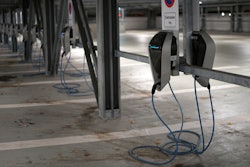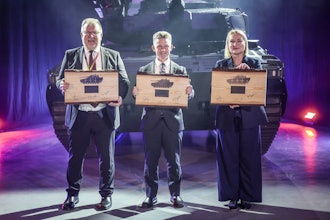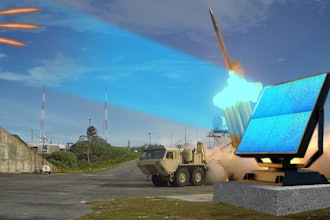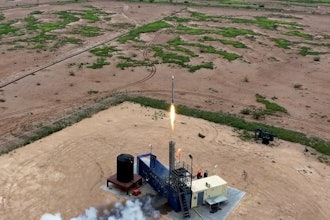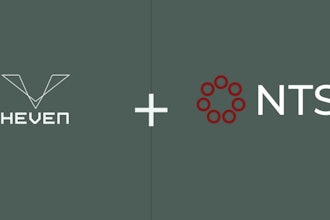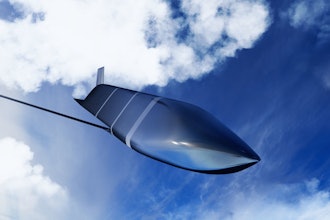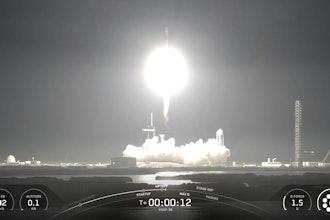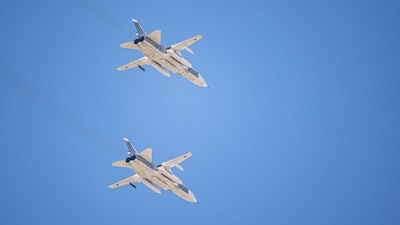
CLEVELAND, Ohio (AP) — A Miami businessman accused of servicing Venezuela's fleet of Russian fighter jets in violation of U.S. sanctions was denied bail as a federal judge determined he was a flight risk due to extensive ties with the South American country's military.
Jorge Nobrega admitted to having been on several Venezuelan air bases, flown in military aircraft and having friends inside the military upon his recent arrest, a federal prosecutor said in an arraignment hearing Wednesday.
The case against the previously unknown Nobrega, which prosecutors said is likely to include money laundering charges, stands out from a bevy of other ongoing criminal investigations focused on corruption in Venezuela because it's one of the first to look into the dealings of Venezuela's military, a key plank of support for President Nicolás Maduro.
It also is likely to shed a light on how Maduro's socialist government began relying on Thailand's publicly-traded Tipco Asphalt, a longtime buyer of the country's crude oil, to make payments around the world once U.S. sanctions imposed in 2019 cut off its access to western banks.
Nobrega after his arrest Sunday at Miami's international airport spoke for more than two hours to investigators from the Department of Homeland Security and acknowledged receiving two payments in March 2020 from Tipco, prosecutor Kurt Lunkenheimer said in court.
More than 2.4 million euros ($2.8 million) allegedly was transferred between March and July 2019 from Tipco to a bank account in Portugal in the name of Nobrega's company, Achabal Technologies, according to federal investigators. Of that amount, the bulk was transferred to Nobrega's U.S. accounts. But about 1 million euros in the Portuguese bank remains unaccounted.
“He may have the means to live nicely outside the United States if he were to flee,” Lunkenheimer argued.
Judge Jacqueline Becerra agreed and said that his ties to Venezuela's government and the fact that he had a common law wife and two younger children living in Venezuela were also a factor in her decision to reject a request for bail that included offering up as collateral two Miami apartments as well as an Orlando home he still owns with his ex-wife.
The criminal complaint and affidavit against Nobrega allege that his Miami company sold to Venezuela’s military a suppressant foam to insulate fuel tanks on its Sukhoi combat aircraft from exploding under enemy gunfire.
In a recorded meeting with an unidentified informant, Nobrega allegedly bragged about meeting with Venezuelan Defense Minister Vladimir Padrino Lopez and likened the technique to a form of “dialysis” that would save Venezuela the expense of sending the fleet in Russia for servicing.
He was allegedly paid for his work by Venezuela's state-owned oil company PDVSA via Tipco.
An Associated Press investigation last year revealed how Venezuela had been relying on Tipco to blunt the impact of U.S. sanctions. In exchange for deep discounts on crude shipments, Tipco would pay PDVSA’s obligations and deduct the amounts from what it owed the Venezuelan oil giant, according to records obtained by AP.
Tipco is not named as a defendant in the criminal complaint. But an investigator for the Department of Homeland Security, citing AP’s reporting, identified the Thai company as the “third-party money launderer” that “collaborated” with PDVSA to move hundreds of millions of dollars on behalf of Venezuela’s socialist government.
U.S. sanctions against Maduro’s government make it illegal for U.S. firms — and those who assist them — from doing business with PDVSA except with a license from the U.S. Treasury Department. Additionally, any export of military equipment or services requires the approval of the State Department, which Achabal didn’t have.
Documents obtained by AP show that Achabal received three payments totaling more than $3.6 million via Tipco between February 2019 and March 2020. Two other U.S.- registered vendors not affiliated with Nobrega received an additional $4.1 million in the same manner, according to the same records.
The documents — invoices, contracts, shipping records, and wire receipts — were provided to AP by a former PDVSA consultant located outside Venezuela on the condition of anonymity for fear of retaliation.
Nobrega, a Venezuelan-American dual national, established Achabal in the 1990s. The company lists as its address on Florida corporate registry a small warehouse near Miami’s international airport identified by giant sign for another company. Several other businesses are also registered at the same address.
There is no indication Tipco knew what services Achabal was providing Venezuela even as it acted as a financial intermediary allowing the company to evade compliance with sanctions.
But investigators obtained documents that suggest Achabal tried to hide its dealings with Venezuela, at one point presenting purchase orders from an Australian vendor specializing in fuel handling equipment to justify more than $800,000 in two transfers to Achabal’s bank account in Portugal.
“Law enforcement is unaware whether these supporting documents reflect actual business dealings and are being reused by Nobrega to provide justification for the wire transfers, or whether they were completely fabricated,” the federal agent said in his affidavit.
Tipco did not respond to a request for comment on the criminal complaint.
But CEO Chaiwat Srivalwat, in an email to AP last year, said that any payments to third parties at PDVSA’s request “strictly corresponded” to its oil purchases from Venezuela.
“Tipco is a PDVSA client, not the Venezuelan central bank,” Jean-Pierre Pastor, Tipco’s representative in Venezuela, wrote in bold and underlined text in an email to PDVSA in January 2020 complaining of the frequent requests for it to pay its vendors.
“Tipco tried as much as possible to assist you in this difficult period,” added Pastor, the brother of longtime Tipco board member Jacques Pastor, who has also served as the head of the Asia-Pacific office for Tipco’s top shareholder, French road builder Colas. “Let’s hope you will not forget it.”




